Running Ryzen 1800x at 4ghz Continuously
Thanks to the Ryzen 7 1800X, and its ilk, Bulldozer feels almost like a long-forgotten dream. Now that AMD's Ryzen CPU tech is here to lay to rest those long, nightmarish days of lacklustre AMD processors genuine competition in the CPU space is here again. The top-end Ryzen 7 1800X offers serious computational grunt for half the price of its Intel rivals, though is still no wonder gaming chip.
The CPU is only one half of the PC picture, you'll also need the best graphics card to support your shiny new processor.
It's hard to believe it's been quite so long in the CPU wilderness for AMD, but since they gambled early on pushing thread-count ahead of single-core performance with the Bulldozer architecture Intel have ruled the roost.
Admittedly the Zen architecture is arguably doing the same thing, pushing the industry forwards towards a cheaper multi-core future, but the timing for that is now arguably better, and AMD have also made moves to shore up the single-core performance of their latest chips.
The big question for us gamers right now though is how much does the $349(£282) Ryzen 7 1800X close the gap with AMD's Intel competition when it comes to primarily single-threaded gaming performance? Though with the spectre of the AMD Ryzen 2 launch in April should you buy now or wait for the new CPUs to land?
Click on the jump links below to quickly skip sections.
- AMD Ryzen 7 1800X specs
- AMD Ryzen 7 1800X benchmarks
- AMD Ryzen 7 1800X performance
- AMD Ryzen 7 1800X verdict
AMD Ryzen 7 1800X architecture
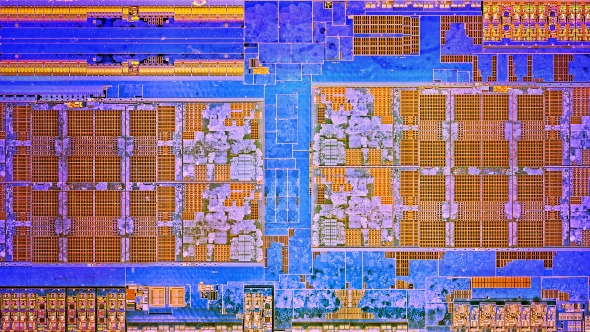
Before we get carried away digging around the performance metrics of AMD's chip we need to have a look at how it's been put together. The Zen architecture represents a brand new, ground-up x86 CPU design, and AMD is right when they say that's a real rarity in today's mature PC component market.
The basic make-up of the 14nm FinFET Zen design surrounds the core complex (CCX). This is a modular chunk of silicon sporting four discrete CPU cores and allows the architecture to scale the core count upwards from there. The octa-core chips then feature a pair of these CCX modules at their hearts to provide this full eight-core design. This modular layout is what allows AMD's Zen-based Naples server and Threadripper chips to pack a full 32 physical cores inside them.
The major departure from the old Bulldozer architecture is the use of simultaneous multi-threading (SMT) to allow the Zen-based chips to better utilise the available compute pipelines and spread the load from a single core. Essentially it nominally delivers two concurrent processing threads from one core, doubling the thread count of processors which take advantage of the SMT tech.
AMD listed the SMT support of the Zen architecture as optional, which pavined the way for them to release lower-spec Ryzen 3 chips without the extra thread count, and potentially future mobile CPUs without the extra multi-threading support.
Partly it's this increased parallelism which provides the Zen architecture with its boosted single-core performance. AMD have also specifically improved other parts of the design to target a higher instructions per clock (IPC) rating for Zen too. The architecture is now better able to predict what work is going to be required next, thanks to its neural network-based branch predictor, and is also able to chuck more work into the individual execution units too.
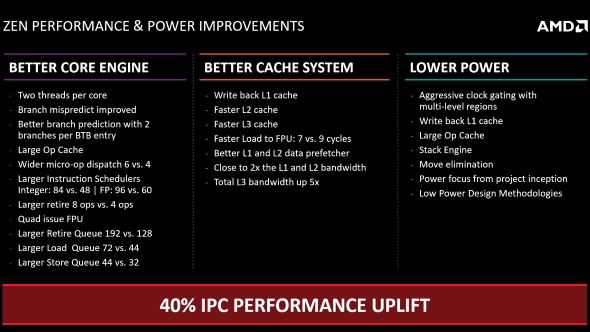
AMD have also made changes to the cache structure of the Ryzen chip's Zen architecture, providing each core with 512KB of dedicated level 2 cache memory and a full 8MB of level 3 cache shared between each four-core CCX module. AMD estimates this provides around five times the cache bandwidth per core compared with the final Excavator generation of the Bulldozer CPU family.
In between the individual CCX modules AMD are using an interface they're calling Infinity Fabric. It's this high-speed interconnect which allows the different parts of the chip, from the cores to the memory to the system controllers, to communicate and feedback to each other. The Infinity Fabric interconnect is intrinsic to the SenseMI tech AMD have also jammed into the Zen architecture.
It's the SenseMI features which allow a Ryzen CPU to dynamically adjust its voltage and frequency on-the-fly as energy and temperature demands require. The Precision Boost and Pure Power features mean the chip can almost instantly push up the frequency and dial down the power on different parts of the CPU in milliseconds. When a part of the processor is not needed it gets gated off and the logic then doesn't draw any power, which can then be distributed elsewhere.
Finally the Extended Frequency Range (XFR) is a feature which apes what Nvidia have been doing with their graphics cards – offering a clockspeed boost if there is enough thermal headroom available to the chip. XFR is primarily available to the 'X' models of Ryzen CPUs, allowing those SKUs to push beyond the clockspeed limits of Precision Boost, essentially given them an automated overclock of around 100MHz beyond their rated Boost clock.
AMD Ryzen 7 1800X specs
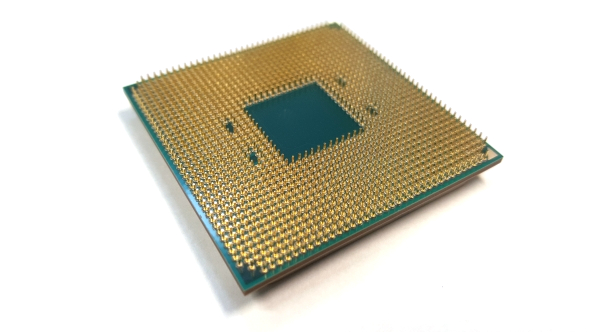
The R7 1800X is the flagship CPU in AMD's Ryzen range of processors and is the top mainstream chip before you get into the ultra-enthusiast Threadripper territory. Inside the R7 1800X are a pair of CCX modules giving it the full eight-core beans with 16 threads of processing grunt to back that up.
That layout means it's filled with 4.8 billion transistors, with the smallest being based on the 14nm FinFET design from GlobalFoundaries. Those are all packed inside a die that's a little over 195mm2. And, because it's rocking two CCX modules, the R7 1800X has a total of 16MB of L3 cache inside it. It's also the highest-clocked of all the Ryzen chips, with a base clockspeed of 3.6GHz and a maximum boost speed (on a single core) of 4GHz.
As an 'X' rated Ryzen processor the R7 1800X comes with a TDP of 95W, like the R7 1700X, to help it get its XFR on when there's the thermal support available. In practice we didn't really see any evidence of XFR pushing up the clockspeeds of the 1800X, though with this early platform our measuring tools aren't necessarily 100% accurate. CPU-Z, AMD's own overclocking tool and Windows all seem to give different results in terms of actual second-by-second clockspeed.
In terms of platform the R7 1800X drops into any AM4 motherboard, as all good AMD chips from here on out should. Well, at least that was the plan before the HEDT Threadripper chips screwed that up for us. We've been testing in an X370 board as that is the chipset which offers the best chance of high-performance overclocking. The B350 chipset also offers overclocking, meant to be of a lower class level, but we're not 100% convinced of the reality of that, while the low-end A320 chipset doesn't give you any at all.
AMD Ryzen 7 1800X benchmarks
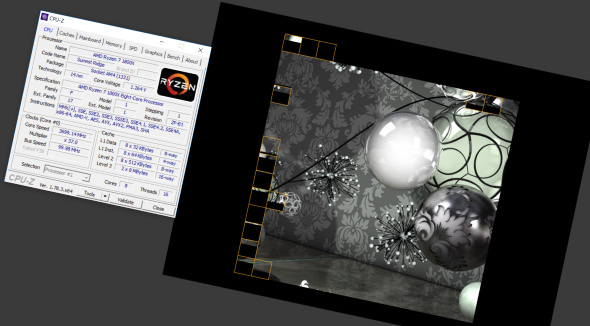


AMD Ryzen 7 1800X performance
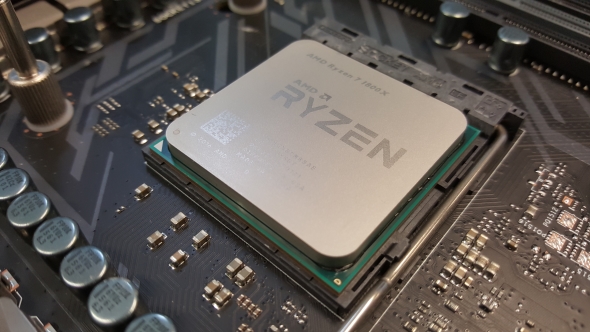
This top-end Ryzen CPU is quite remarkable. In pretty much any computationally intensive benchmark you care to throw its way the R7 1800X will greedily chomp through it before rapidly coming back for more. It's one of the finest performers in the Cinebench test I've ever seen at this level, with only Intel's $560 (£505) octacore i7 7820X and almost $1,000 (£1,000) i9 7900Xbeating it. But those are far more expensive CPUs.
And that's with our sample seemingly refusing to top 3.64GHz when all its cores were occupied. My first taste of XFR hasn't been the most exciting…
The six-core i7 8700K and i7 7800X sit behind AMD's top mainstream processor until you start to factor in the broader overclocking potential of Intel's modern silicon. In fact they both struggle against the slightly slower AMD Ryzen 7 1700Xin terms of straight CPU performance.
At launch the Ryzen processors all struggled on the memory side of things, unable to consistently hit the highs many memory modules list on their specs sheets. That has been subsequently fixed via AGESA BIOS updates. Now the memory support is far more widespread, so finding compatible high-performance DDR4 kits isn't the trial it was at first.
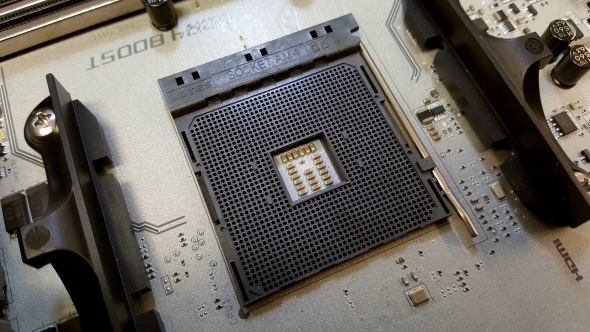
But it's really the gaming performance that we care about, and that's where a lot of the concerns for Ryzen have… er… arisen. Before I get into that though a quick note about testing – I've heard a lot of people getting stick for testing at 1080p when they themselves play at 1440p or 4K and want to see results for that. But here I'm testing the R7 1800X, not the GTX 1070 we've used in our test rig since we started benching CPUs here at PCGamesN.
At 1440p or 4K all you're really testing is the GPU performance, even at 1080p you can run into GPU limitations – as with Rise of the Tomb Raider – but you will still get a better idea of the performance delta between different chips when you're not overly taxing the graphics silicon.
The performance difference though can almost disappear at the higher resolutions, so you may ask what does it matter? But as GPU power increases over time, as it inevitably does, the hidden performance differences will become more apparent as the platform matures. You may not care about it now, but you might in a year or two.
The good news though is that the performance delta between the top-end AMD chip and the Intel competition isn't that great. There are though a couple of cases which display a severe performance difference, most noticeably in the older Total War tests where the R7 1800X is around 17% slower on average than the similarly priced i7 8700K.
We knew that Intel's high-performing cores would mean they could retain their lead as the go-to purveyors of gaming CPUs, but the fact AMD have closed the gap this much with the limited R&D resources they have at their disposal should be applauded.
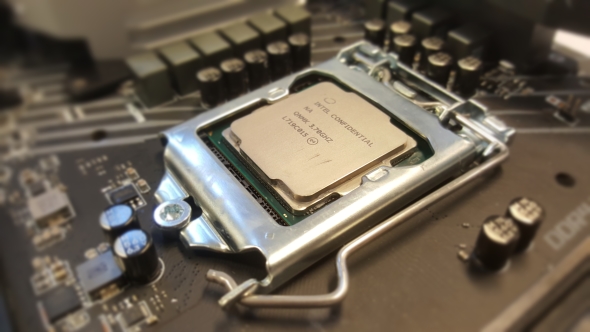
Ryzen is also a hot and thirsty architecture by comparison too. Even if AMD are to believed that their own Ryzen monitoring software is reporting the temperatures incorrectly (or correctly so "all AMD Ryzen processors have a consistent fan policy") it's still pretty toasty. The 'X' chips are supposedly reporting temperatures 20°C higher than the real CPU temps, but even then the 1800X is idling – under liquid chilling – above the 40°C mark.
And that plays into possibly why the Ryzen 7 1800X isn't a particularly impressive overclocker. The 1800X is designed to boost up to 4GHz on a single core and it's simple to switch that around so all cores are running at that speed, but pushing any further is a lot tougher. We managed an almost completely stable 4.1GHz all-core overclock by upping the multiplier, but had better luck (i.e. a more stable chip) pushing up the BCLK and dropping the multiplier. Even then the actual performance improvement was negligible and with AMD themselves recommending you don't run with a core voltage of 1.45v, or else risk the longevity of your silicon, it doesn't seem to make a lot of sense running Ryzen above stock clocks.
The Ryzen platform as a whole does also seem a little slow out of the blocks. It's nothing to do with the storage performance of the setup, but it seems to take an age for our system, with a high-end Asus X370 board, to even get to the POST screen.
- Check out today's Amazon US and Amazon UK pricing.
AMD Ryzen 7 1800X verdict
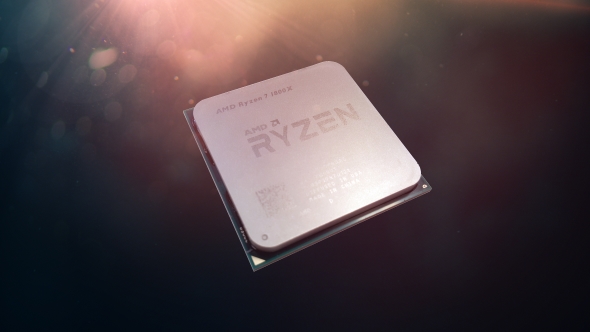
I didn't love the Ryzen 7 1800X at launch. It's high initial price meant it couldn't be the processor I'd instantly recommend any PC gamer out there buy, yet it's always been tough to argue against what an important processor it is. With Ryzen AMD haven't taken the CPU market by storm, they haven't ousted Intel and they're not suddenly going to become top dog. But what they have done though is become competitive and relevant once again.
But with the recent price drops, bringing the 1800X more in line with the Coffee Lake i7 8700K, that makes it a much more tantalising prospect. It's got the top mainstream Intel chip licked in terms of straight CPU performance and it's incredibly close when it comes to gaming speeds too, to the point where there's often almost nothing in it.
The fact there is even a question as to whether you should consider Intel or AMD for your next purchase, and that it's not just an automatic decision, is huge. Of course it helps AMD have gone so aggressively into the market with the pricing of their new chips. Undercutting Intel's high-end range by so much was always going to be disruptive, but it was something AMD had to do to get noticed.
It does thoughmean AMD are almost reinforcing the old-school status quo, still occupying the more price-conscious end of the CPU spectrum. Money-no-object you'd go for the Intel platform whether you're a gamer or a serious content producer. They still have the absolute best processor technology and motherboard platforms around. But AMD have produced a great-value eight-core processor for those who can't, or don't want to, spend over a grand on one.
But that said, we've long been suggesting the Ryzen 7 range aren't the chips gamers should be excited about. The Ryzen 5 range, with the stunning R5 1600X, is able to deliver almost Intel i5 levels of gaming performance while offering three times the thread-count for the same price. That's where the smart gaming money goes. But with the new Ryzen 2000-series CPUs looming large, the Ryzen 7 2800X that's coming in April should deliver a healthy performance uplift over the first-gen Ryzen. As long as AMD don't go crazy with the pricing, in line with what's happened with today's graphics cards, then it's tough to recommend buying a Ryzen 1000-series chip right now.
- Check out today'sAmazon USandAmazon UKpricing.
Source: https://www.pcgamesn.com/amd/amd-ryzen-7-1800X-review-benchmarks
0 Response to "Running Ryzen 1800x at 4ghz Continuously"
إرسال تعليق